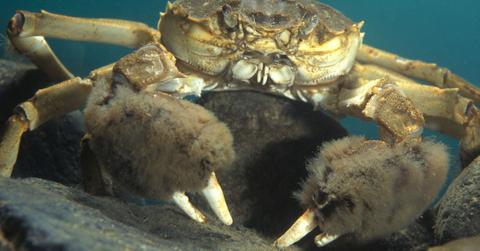How an Invasive Alien Species Cost Billions of Dollars in Damage Before Humane New Control Method Proved Promising

A promising new method has emerged in the fight against the Chinese mitten crab, an invasive species wreaking havoc in rivers across Europe.
Advancements are being made in the battle against the invasive "Chinese mitten crab," a persistent species causing disruption to ecosystems and economies.
Researchers are finding success with a new trapping technique as they explore humane approaches to manage these crabs and consider potential uses for the captured specimens.
Originating in Asia, Chinese mitten crabs have spread across European rivers over the past century, posing threats to native species and causing substantial harm to fisheries and aquaculture.
They have established populations in 18 European Union member states, earning a spot on the list of the world's 100 worst invasive alien species.
A recent CNN report revealed that the University of Antwerp and the Flanders Environment Agency in Belgium have achieved notable success in eliminating the crabs using traps.
Installed alongside metal channels across riverbeds, the traps create a pathway for other aquatic species to swim out, while the crabs are directed through pipes into cages where they are collected.
Since 2018, three such traps have been operational in Belgium, capturing approximately 3 million crabs, according to Jonas Schoelynck, a professor of aquatic ecology at the University of Antwerp.
This trapping method is deemed more cost-effective and less labor-intensive compared to alternatives, such as nets, which often result in bycatch — the unintentional capture of other animals.
- What Lies Beneath: NASA Scientist Believes Aliens May Have Found 'Perfect' Hiding Spot in Earth's Oceans
- Global Threat: Russia Insider Warns West of 'World War Using Nuclear Weapons' Amid Escalating Support for Ukraine
- Countdown to Disaster? Ex-NATO Official Warns Russia, Iran and China Could Wage WWIII in Just Years
Schoelynck explained that the crabs are challenging to eradicate due to their prolific reproduction, adaptability to various environments and the absence of natural predators in European waters. Furthermore, their ability to breed with other mitten crab species and form hybrids contributes to their genetic diversity and resilience.
The economic impact on the EU has been substantial, with an estimated annual cost of €12 billion (about $13 billion). The development of the new traps falls under the EU-funded project "Clancy," initiated in 2023 to find effective solutions to combat the invasive crabs.
Never miss a story — sign up for the Front Page Detectives newsletter. Be on the scene the moment news breaks.
Björn Suckow, a scientist at the Alfred Wegener Institute in Germany, anticipates the project will provide insights into the most humane methods for dealing with the captured crabs. Additionally, there is consideration for potential uses for the collected specimens.
Although Chinese mitten crab meat is not popular in the European market due to its limited quantity, crabs caught in one of the traps in Belgium are being utilized to feed animals at a local zoo, according to Schoelynck.
Ongoing research aims to deepen understanding of the invasion, facilitating collaborative efforts among countries to control crab populations. Schoelynck emphasizes the importance of coordinated action across borders, stating that political boundaries do not constrain these invasive animals.
Become a Front Page Detective
Sign up to receive breaking
Front Page Detectives
news and exclusive investigations.
